The protected hand-dug well serving the 500 community members of Lungi Lol cannot provide enough water because it is too shallow to refill water fast enough to meet the demand. Seasonal drying four months out of the year makes the water level even more deficient. Community members must make a difficult decision and resort to collecting water from the area swamp, facing significant risks.
Drinking contaminated water is unsafe for human consumption. Community members have no alternative, so they suffer from water-related illnesses and infestations of worms and amoebas. Struggling with decreased energy and health leaves people missing out on important activities like work and school.
The area around the swamp is well known as a hiding place for dangerous snakes, and people run the risk of being bitten each time they fetch water there, especially children. Young girls have a spot near the stream scoop hole where they pluck palm kernel nuts, and on an unfortunate day, Rashidatu (16) was busy plucking away when a snake sprung at her hand, biting her. She fell unconscious and was immediately brought to the village, but thankfully later regained consciousness because the bite inflicted did not have enough venom to be deadly.
The months of the dry season are the hardest to access safe water in the community. It is grueling work to go back and forth carrying heavy water containers while squatting because of branches that hang low along the footpath. Most people are only able to make two round trips a day.
"I normally take to the stream two buckets. [It is all] I can manage and bring it all back from the far distance. Anything more than that will have to wait until the evening or the following day," said 20-year-old mother, Fatmata Conteh.
Children especially feel the pressure, as they wake early to collect water. Waking up so early in the morning and expending the energy to collect water makes it difficult to stay awake and concentrate in school.
Fatmata D., 16, said, "My siblings and I are tasked with the responsibility of fetching water every day before and after school. I prefer fetching water early in the morning than when I return from school. In the morning, I harbor hope on the leftover rice and sauce left from the previous night, usually [still on the] hot fire. It is usually ready just in time to eat the moment we are done fetching our portion for that morning." She continued, "The hard part comes when I come from school under the hot 2 pm sun and [I] am told to go and fetch [water] on an empty stomach."
Fatmata is not shy about letting her mother know she is hungry when she arrives home from school before collecting water for the afternoon by saying, "An empty bag cannot stand!" Her mother gives her a cup of gari with sugar (a derivative of cassava) to hold her over until the evening meal as she makes the trek back to the swamp.
The proposed water project will convert the hand-dug well near the mosque to a borehole. This conversion will eliminate seasonal drying and provide sufficient, clean, safe water for the community throughout the entire year.
Here's what we're going to do about it:
Well Rehabilitation
The well marked for this overhaul is dry for a few months every year and needs major work to supply adequate, clean water to the community year round. The pump will be removed, and a hand auger will be lowered inside and powered by a drill team. This hand auger will allow the team to drill several meters deeper to hit a sufficient water column that will ensure the well supplies water throughout all seasons.
As the team drills, a casing will be installed, transforming the bottom of this hand-dug well into a borehole. PVC piping will connect this lower system directly to the pump, a construction that we know will also improve the quality of water.
Once this plan is implemented, everyone within the community will have access to safe drinking water in both quality and quantity, even through the dry months.
Hygiene and Sanitation Training
There will be hygiene and sanitation training sessions offered for three days in a row.
After our visit, the hygiene and sanitation trainer decided it would be best to teach community members how to build a tippy tap (a hand-washing station built with a jerrycan, string, and sticks). They will use these tippy taps for handwashing demonstrations, and will also teach about other tools like dish racks and the importance of properly penning in animals.
These trainings will also strengthen the water user committee that manages and maintains this well. They enforce proper behavior and report to us whenever they need our help solving a serious problem, like a pump breakdown.

 Borehole Well and Hand Pump
Borehole Well and Hand Pump



































